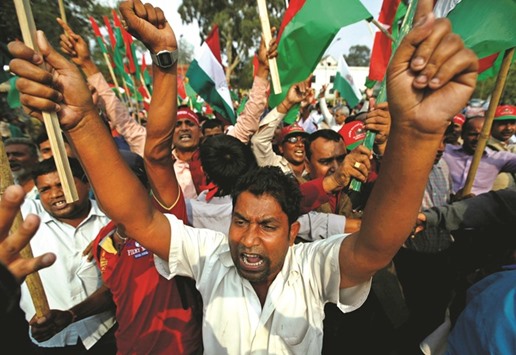After their six-month-long agitation in the Terai over Nepal’s new constitution during which 59 people were killed, all eyes are now on an indefinite stir by Madhesi parties in capital Kathmandu.
For the protest, Madhes-based parties have brought on board other dissident groups, mostly from indigenous and ethnic communities who are equally unhappy over the constitution, which they say discriminates against them.
They have formed an alliance, Sanghiya Gathabandhan or Federal Alliance.
The alliance has warned the government that if the government tries to suppress their agitation, it will be the “beginning of a civil war”. The earlier agitation, of blockading the trade entry points with India on the border, ended in mid-February this year.
With 36 rounds of talks with the government since promulgation of the new constitution since last September making no headway, the level of frustration and unhappiness has mounted in the Terai region, bordering India, where the Madhesis and other indigenous communities reside.
The alliance is now in a mood not to bow down before the government.
The alliance this time has changed its form of protest. During the last protest, the protesters blocked the key Nepal-India border for almost six month, that made public life very difficult and public anger grew against them.
This time, the alliance is all set to hold a Kathmandu-centric protest that will see them picket the main administrative building, Singha Durbar, where key government ministries, including the Prime Minister’s Office, are located.
Keeping in mind that the upcoming protest could turn violent, the government has made preparations to not let the
protest get out of hand.
A team of security agencies has already organised a demo around Singha Durbar on how to control the riot in case it turns violent.
The alliance is determined to make the K P Oli-led government address their demands to make the constitution more inclusive, and revisit the issue over demarcation of the seven federal units.
The alliance comprises of 27 political parties, including the seven parties of Madhesi Morcha.
Addressing a press conference on Friday, chairman of the Madhesi Janadhikar Forum-Nepal (MJF-N) Upendra Yadav, a key leader of the alliance, said: “We held 36 rounds of talks with the government, but the government
didn’t seem sensitive.”
“That’s why we are forced to resort to agitation,” he said, adding: “Now it’s not dialogue but only agitation that will find a way out.”
The government and alliance had recently exchanged letters on holding formal talks but no headway was made in the
negotiations.
“Our agitation will be peaceful and non-violent. We have also cautioned the government that it should not give a violent turn to the protest as in the past,” says a joint statement signed by the Samajbadi Forum chairman Yadav on behalf of the alliance.
“The country could plunge into a long-term struggle and civil war if the government tries to suppress the people’s agitation. We warn that the government should take the entire responsibility in case such a situation ensues,” the statement adds.
Yadav said: “We have heard that the government is preparing to mobilize the army to tame our agitation. It is the people’s army and people will respond if the army is being mobilised.”
The alliance has decided to start its demonstration from Shantibatika in Ratnapark from yesterday.
The alliance will picket the Singha Durbar every day from today. It has demanded that the government take action against black marketeers, make diesel, petrol and cooking gas easily available, rehabilitate survivors of the earthquake and implement the past pacts signed with the agitating Madhesi parties.
Key leaders of the alliance, including Rajendra Mahato and Hridyesh Tripathi, addressed the press conference.

Supporters of Federal Alliance, a coalition of Madhes-based parties and other ethnic political parties and organisations, protesting against the constitution in Kathmandu yesterday.
